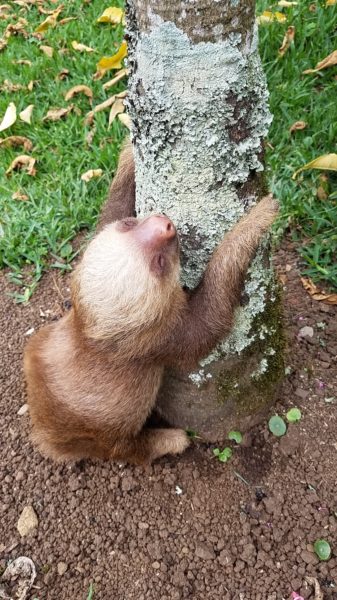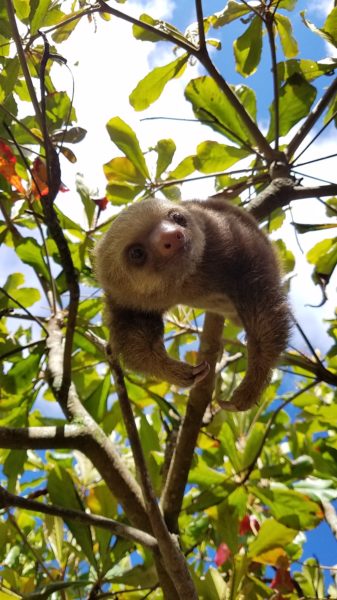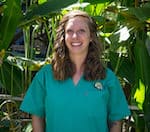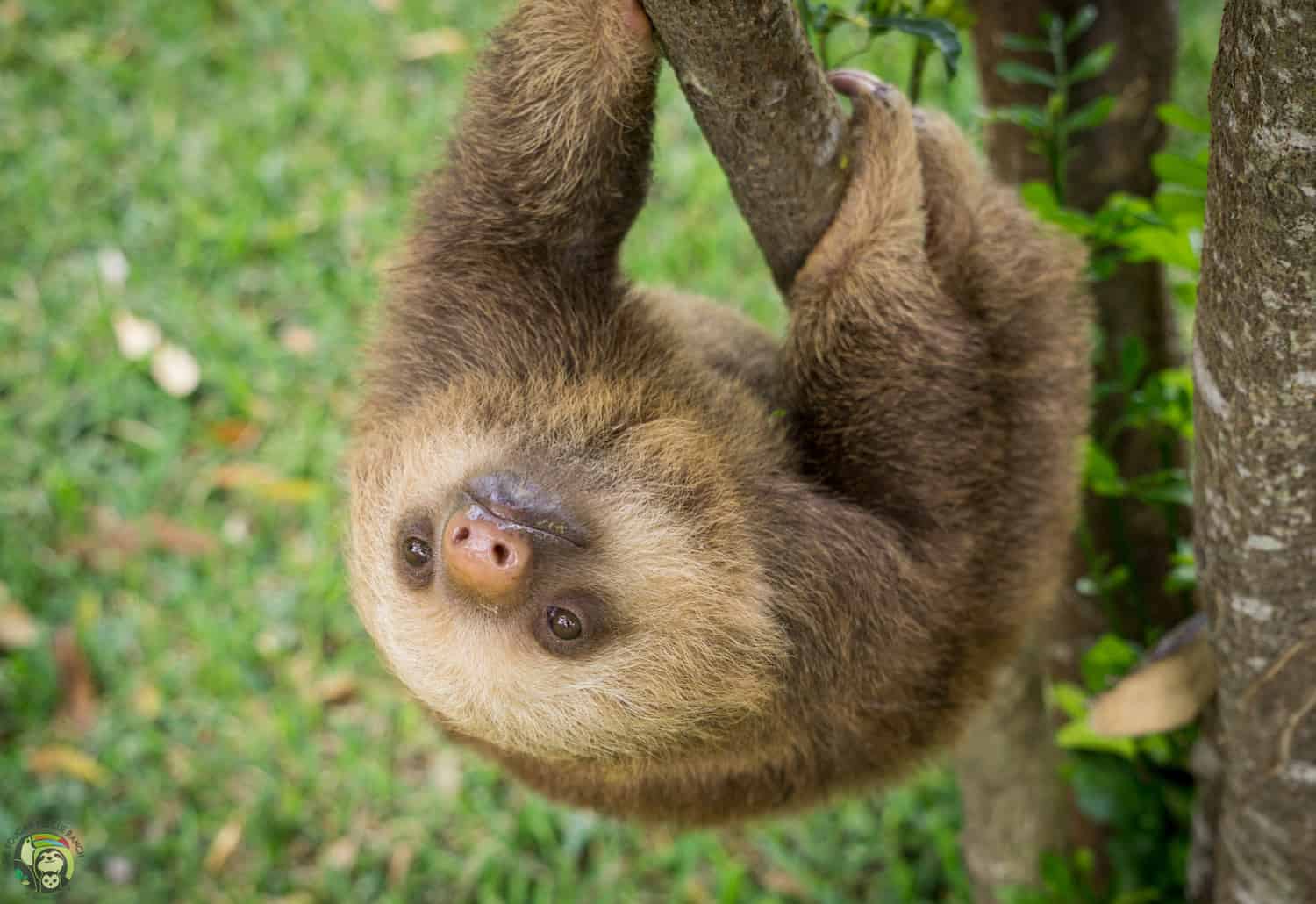When I was planning at the beginning of this year for my sloth rehabilitation internship in Costa Rica, little did I know how drastically not just my world, but the whole world, was about to change.
My flight landed on time, my arranged taxi was waiting for me and I spent a pleasant night in San Jose. The next morning, eager to start my day, I had breakfast at a lovely cafe and then ordered an Uber to make my way to the Toucan Rescue Ranch. As it seemed, life was proceeding as normal as I started on my new journey.
Taking it all in upon arrival, I got to know the layout of the ranch, my fellow interns and volunteers, and an overview of my new responsibilities. Introductions were made to the wildlife I’d be working with for the next 6 months, which of course was the highlight for me. Meeting Oatmeal, Millie, and Bradley plus so many more amazing sloths — right away I knew this was going to be a life-changing experience. Only then I didn’t realize how it would be changing in so many ways.
Just as soon as I felt I was adjusting to my new daily routine here, the COVID-19 pandemic had officially taken over. No longer was it just a possibility, no longer was it just in China. It was at our front doors and spreading, fast.
The world went on lockdown and life for everyone was no longer the same. No more fun nights in town, no more casual breakfasts at cafes. Quarantine quickly became the new norm as everyone was asked to stay at home to help limit the spread of the virus.
Luckily though for me, being asked to stay at home meant I’d be with all the animals I had come to know and quarantine together with the sloths.
While my friends and family spend time indoors social distancing, playing board games, or making crafts to pass the time and stay safe, my quarantine is spent working outside every day, helping rehabilitate many animals in need.
A lot of responsibility comes along with being a sloth rehabilitation intern. And one task that is part of the process is taking baby sloths to potty every day.
Since so many sloths come to us at an age where they would still be growing up with their moms, the need to act as a surrogate in many ways is required to help rehabilitate them.
So, every morning, I bring each sloth one by one out to our designated potty areas and stimulate their senses by having them smell a pee-soaked paper, which lets them know it is time to go potty.

This simulates when their mom would pee and poo herself and then the baby sloth would naturally follow suit. The smell of her pee would signal to the baby that it is time to go potty, too.
Once the baby sloth is ready to go, they will wiggle their bums which I like to call “the potty dance,” and once they settle, they slowly close their eyes and almost seem to smile when they start to go potty.
It’s a very important part of the rehabilitation process for us to take them potty so as they grow and get older, they will eventually learn to go on their own, just as they would in the wild.
Another crucial aspect of the sloth rehabilitation process is taking sloths out for exercise. When the sloths are old enough that they would be less reliant on their moms, they would start climbing around in their treetop environment independently.
Each day after potty time, I bring our teenager sloths out to a group of trees we have designated for rehabilitation so that they can climb and explore, as well as find and eat leaves. This exercise time is required daily so that they continue to progress in the rehab process and grow to be healthy, strong, individual sloths.
Watching these sloths grow from babies that needed help going potty to teenagers that confidently climb throughout our rehab tree, picking the freshest leaves to snack on, is a very rewarding and heartwarming sight to witness.

Though these are just a few examples of the tasks I do each day, so much goes into the complete rehabilitation process of these amazing animals. Each and every task purposeful and meaningful. Each and every day teaching me more and more.
As days passed with the sloths, of course, there came a moment when the state of the world became increasingly worrisome that I questioned if I should go back home to be with my family. But I thought to myself, there is no place in the world I’d rather be right now than here with the animals doing the work that I love. And I must admit, I don’t regret being quarantined with the sloths one single bit.
Having made my decision to stay and getting to know each sloth we have better, one sloth that has really found a place in my heart is called Brad Pitt, whom I have affectionately nicknamed Bradley.
Bradley came to us as many baby sloths do, orphaned and afraid. He and his mother were found on the ground together and sadly she was unresponsive. They were both taken to the clinic where every effort was made to save her, but unfortunately, she did not survive.
The cause of Bradley’s mother’s death remains undetermined, though theories suggest she became intoxicated by agricultural pesticides. Unfortunately, these chemicals are becoming more commonly used around Costa Rica in pineapple, palm oil and banana plantations.
Since a variety of wildlife lives nearby or within these plantations, several rescue centers are receiving animals in similar situations to Bradley’s mother and sadly, not all can be saved.
However, Bradley was sent to us at TRR for rehabilitation and is absolutely thriving! He is a very strong, courageous, and handsome little man.
Usually, he is the first sloth I take potty in the morning, and he always goes right away without fail. The face he makes always brings a smile to mine.
Bradley loves climbing blissfully in our rehabilitation tree searching for the freshest leaves to eat. And never relents when it is time to come down for the day.
Since he is still at the age he would be with his mom, I give him a teddy to hold on to at night, which brings him comfort. We are even introducing him to other sloths in hopes he makes a friend!
In the meantime, while Bradley is growing and still finding his way, I make sure he never feels alone. I’ve been closely monitoring his behavior and do everything I can to support him just as I do for each and every sloth. From personally building him a structure to climb on at night, to make sure he always has his teddy to cuddle, Bradley is thoughtfully and lovingly taken care of.
During these uncertain times, as the virus is still running its course and many of us feel helpless and maybe a little afraid, I think the most important thing we can do is be there for each other. Just as I am here for Bradley and all the other sloths.
We should make sure no one feels alone, whether it be checking in with a simple text to your friend, or giving your grandma a phone call to make sure she’s doing ok. While maintaining quarantine and the social distancing recommendations, there are still so many ways to show your love to one another.
Supporting each other through these trying times is crucial to get through this pandemic together. I know my world is forever changed by my work here with the sloths. But it has also changed with the effects the pandemic is having on my loved ones too. Just remember to not let anyone ever feel alone and of course, washing your hands doesn’t hurt too.

— Sara Hatch is a Sloth Rehabilitation Intern at Toucan Rescue Ranch.
About Sara Hatch
I am an enthusiastic 29-year-old Colorado native with a strong passion for wildlife conservation, a true love for the outdoors, and an adventure-seeking spirit. I have volunteered around the world, spending many months with a variety of wildlife, and I have proudly come to the realization that wildlife conservation, focusing on rehabilitation and release, is my true passion in life and I want to do everything I can to support the many endangered species needing our help around the world. Following my 6-month sloth rehabilitation internship at Toucan Rescue Ranch, I plan to attend veterinary technician school with the desire to expand my knowledge and skillset so I can better help animals in the rehabilitation process.






